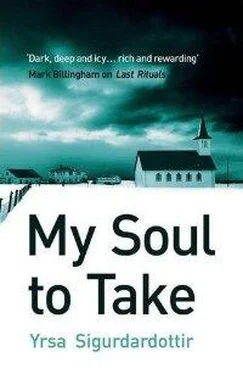Although her forehead stung terribly from the cold, the expressionin his eyes chilled her more. She twisted her head away and put her hands in her anorak pockets. She was frozen, and her woolen mittens
offered little protection from the sharp wind. She felt something in her right-hand pocket and remembered the envelope. A deep apprehension seized her, momentarily eclipsing her fear of the man. She had promised her mother that she’d deliver the envelope, and now it seemed that she would fail her. This was the last thing her mother had said to her, and the child remembered clearly how much it had seemed to matter. She felt a tear trickle down one cheek. She couldn’t give the envelope to the man, because her mother had expressly told her not to. Biting her lower lip, the girl didn’t know whether to speak or keep quiet. She squeezed her eyes shut and wished that instead of standing here she was lying by her mother’s side and that nothing had changed. Then she opened her eyes and they were still standing there, she and the man. A sense of hopelessness overcame her and she wept silently, letting the tears run down her cheeks into her scarf.
The man took her by the shoulder again. “God will give you a good welcome now. Do you know any prayers?” Nervously she nodded. “Good.” He looked down into the hole. “I’m going to put you down there now, and God will come and collect you later. It’s best if you say your prayers until He comes. You’ll be cold, but then you’ll fall sound asleep and before you know it you’ll be with your mother in heaven.”
At this, the child started crying harder, trying desperately to stifle her sobs. This wasn’t right. Why couldn’t God just come and get her now, if He was so good? Why did she have to go down into that dark pit? She was afraid of the dark, and this was a bad place—her mother had told her so. The girl looked at the man and knew she was going down there whether she wanted to or not. She was rooted to the spot although her instincts told her to run as fast as she could. Through the tears in her eyes she looked at the hardened face of the grown-up and begged in a small voice, “Please.” The man simply stared back and his expression showed no mercy. “Please,” she repeated. “Please don’t make me.” The man did not dignify her pleading with an answer but put his hands under her arms and lifted her up, then slowly lowered her down into the hole. The little girl sobbed as her body began the descent. “Please don’t.” She turned her head to see her home for the last time, and stared in astonishment at the gable window facing them. Someone was standing there, watching, but the window was too dirty and the house too far away for her to see who it was. Finally her terror overcame her fear of the man and she began to thrash around in his grip, screaming as loudly as she could. The person in the window needed to know she did not want to go into the darkness. “Idiot,” the man muttered and he released his grip. The girl fell into the black abyss and landed with a thud some feet below. She tried to get up but her leg was hurt. “Please don’t leave me,” she yelled at the face she could make out staring at her from above. It was all she could see as all around her was blackness darker than the darkest night. She tried not to give in to the terror she felt. God was good. It wasn’t a ghost at the window. God was good. And the low, mournful wailing she could hear down below was not the crying of the dead children. God was good. Mommy said so.
It was much colder inside the hole than outside. She tried to raise herself up as the floor was even icier than the seat of the car had been. Her injured leg sent a jolt of pain up her small body when she stood up so she immediately hunched back down again. The pain was strangely welcoming as it took her mind off her situation for the brief moment it lasted. Unfortunately a chilly numbness followed the pain and the little girl fumbled around with her mitten-clad hand to make sure that her leg was still attached. The cold and the darkness in the hole were stifling and she hugged herself in an attempt to keep the little warmth left in her body from escaping into the darkness. The hatch swung down and just before it closed she heard the man say, “Good luck. Say hello to your mother, and to God. Don’t stop praying.” Everything turned black. The girl tried to catch her breath, but her sobbing made it difficult. What upset her most was that the envelope would never be delivered. She squeezed her eyes shut, because the thought of sunlight always calmed her. Maybe someone would come to get her. Surely the person at the window would save her. Please, please, please. She didn’t want to stay here anymore. She clasped her hands together and whispered:
Now I lay me down to sleep
I pray the Lord my soul to keep,
And if I die before I wake,
I pray the Lord my soul to take.
Tuesday, 6 June 2006
“Letter aperture,” Thóra corrected them with a polite smile. “In the documentation it’s called a letter aperture.” She pointed to a printout on the desk in front of her and turned it toward the couple sitting opposite her. Their scowls deepened and Thóra hurriedly continued before the man began yet another tirade. “When Regulation No. 505/1997 on basic postal services was superseded by Regulation No. 805/2003 on comprehensive postal services and their implementation, Article 12 on letterboxes and letter apertures was revoked.”
“See!” shouted the man, turning triumphantly to his wife. “That’s what I said. So they can’t just stop delivering our mail.” He turned back to Thóra, sat up straight and crossed his arms.
Thóra cleared her throat. “Unfortunately it’s not quite that simple. The new ruling refers to a building regulation concerning letter apertures and their location. This states that letter apertures should be positioned so that the distance from the ground to the lower edge of the letter aperture should be between a thousand millimeters and twelve hundred millimeters.” Thóra paused briefly for breath, but couldn’t stop for too long in case the man interrupted. “The Postal Services Act No. 12/2002 then states that postal-service providers may return mail to the sender if the letter aperture is not in compliance with regulations.”
She got no further, because the man had heard enough. “Are you telling me that I won’t have any more mail delivered to me and have no right to appeal against all this red tape?” He harrumphed theatrically, waving his arms around as if fighting off an attack by invisible bureaucrats.
Thóra shrugged. “You could always move your letterbox higher.”
The man glared at her. “I was hoping you would be more use, especially after you promised to look into the matter before we came.”
Thóra wanted to take the regulation and throw it in the man’s beetred face, but she made do with gritting her teeth. “But I did,” she said calmly, forcing a smile.
She had expected the couple to be astonished at her encyclopedic knowledge of the matter and her prowess in reeling off the numbers of the regulations, but she should have realized that this case would be like banging her head against a brick wall. The agitation in the man’s voice when he telephoned the lawyers’ office two days earlier should have rung warning bells. Talking a mile a minute, he had requested legal advice for himself and his wife about their dispute with both the postman and the postal company. They had just moved into a prefabricated house that they had imported from America, which had arrived with all the trimmings—including a front door with an unlawful letterbox. One day his wife had come home to find a handwritten note on the door stating that no more mail would be delivered because their letterbox was too low. In future they would have to collect their mail from the post office.
Читать дальше












